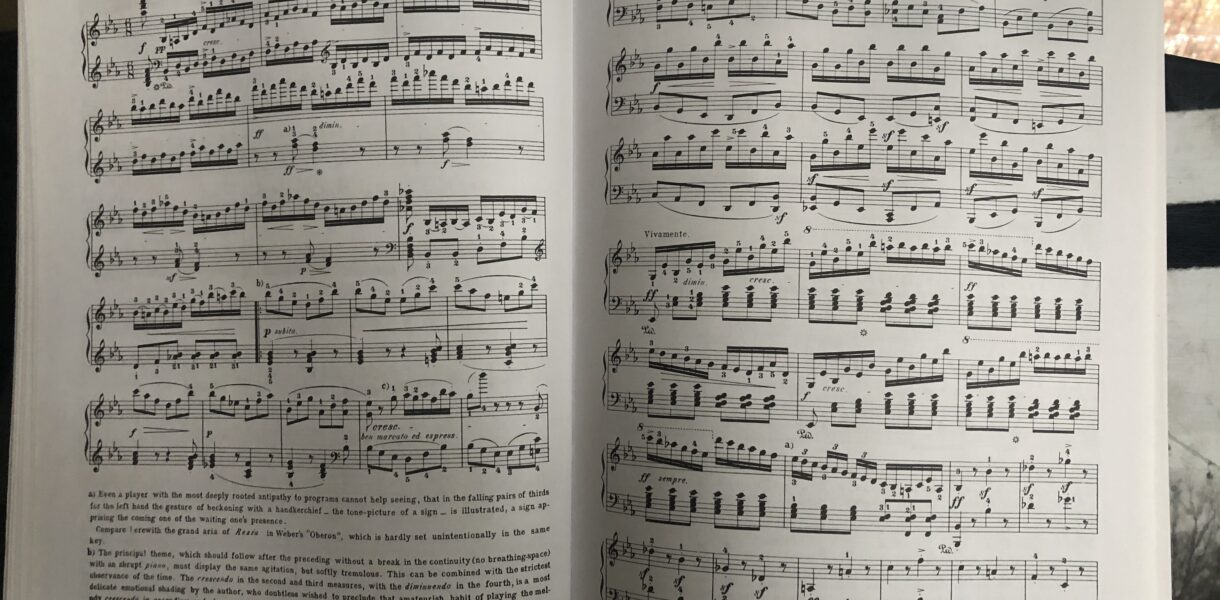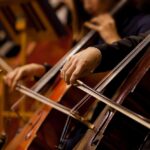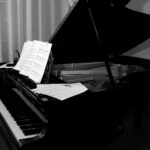In the first part of a two-week series, I look at how music is memorized and what the dangers are of memorizing by repetition.
Afraid of My Own Memory
It’s common practice these days to perform solo music without a score, so musicians are always memorizing. But it’s not a few things that musicians must memorize, no, it’s often hours upon hours of concertos, sonatas, elaborate and intricate works with thousands of notes that must be subtly reduced to one musician’s memory.
But such a daunting task is considered to be a baseline of playing, something that musicians are just expected to do! Memorization is not the reason we are musicians. We aim to play with musicality, and expression, and insight. But memorizing music is often necessary for this pinnacle of playing to be reached. Actually, one of my least favorite compliments to get as a musician is, “Wow, that’s amazing you could memorize all of that!” because it makes me think that everything else that I strive to achieve – a singing tone quality, rounded phrasing, innovative interpretation – is not memorable enough. I hope that everything I am most proud of in my music, the music I worked so hard to make my own, transcends the mostly irrelevant act of memorization. But of course, the process of memorization cannot be dismissed. It is unavoidable for musicians of today’s world.
I remember playing in my first competition. I was around twelve years old and I had just started with a new teacher. I had awful technique at the time since my musical studies up to that point had lots of missing pieces to them. I learned a movement of Kabalesvky’s 1st Piano Concerto, a student work that was the first concerto I ever played. I remember practicing so much and carefully working on my technique for the first time ever. But, in the competition, I still remember that memory slip and false entrance so clearly! Who knows if the audience ever heard, but I did. We’re always told that by having more opportunities to perform on stage, we’ll become less nervous. However, long after this day, it seemed that I’d be stuck in an endless loop of my own thoughts every time I walked onto a stage. Sometimes I’d have memory slips and miss parts completely. More often I’d make it through the notes but sacrifice the lyrical and melodious aspects, worried about forgetting something and playing wrong notes. I stumbled in circles in my head, and it seemed like I was afraid of my own memory.
It’s an incredibly aggravating and frustrating thing when your mind fails you at the times it matters most. Why, for some reason, can we always remember what to play in the practice room, but not in the concert hall? Why do we still have memory ‘slips’ on stage even when we know what we are playing so very well? Everything we rehearsed and thought we knew falls apart in the blink of an eye. It’s so easy to blame it on the stress of being on stage. But perhaps the key to avoiding this is not trying to run from nerves and performance anxiety. Perhaps the answer lies in how we memorize.
So, how have I slowly worked up to a point where I can confidently rely on my own brain to get me through? I’ve had to re-think how I learn music, and more specifically, how I memorize music. It’s all a mind game, and the way to defeat the mind’s shortcomings is not just to practice more, or to have more opportunities to play on stage. If all that you do is continue to prepare the same way, nothing will change. Mistakes will be reinforced instead of improvement, and it will lead to an endless rut of doubting your own mind.
Repetition
The human brain is incredibly capable of remembering processes. How does a brain learn to do these things? Through repetition. The repetitive process is how we subconsciously sear things into our brains. It’s the reason why, when driving to work or school, we remember exactly where to go, what the road looks like, and what color the exit sign is while we are driving, although we can’t necessarily recall this information when we’re not in the process of doing so. It’s the reason why, when we study for tests, it is so much more effective to write and practice problems instead of staring at a page and hoping to absorb all of the information. It’s also the reason why we drive ourselves crazy during the test because we forgot something and know it’s on the page of notes, and when we look at the notes later, we think “I knew that and I can’t believe I forgot it.”
It is completely possible to learn music by straight repetition. If you take a piece of music and just repeat it endlessly, you will learn it. And that’s what most people do. When musicians are practicing for hours upon hours a day, and especially when playing a piece that they spend a lot of time with, memorization in this way is quite easy. However, there are two major issues from relying on repetition. First, the music won’t be memorized for long. Whenever you stop the routine repetition, if you want to re-learn the music a month or two down the road, the stored memory will be mostly gone. The second issue is, once you change one of the variables and you rely on repetition to perform it, it can go terribly wrong. The environment of a performance is so different than the environment of a practice session. It’s a different room, with people watching, and nerves are high. Often, a bow shakes, or fingers are sweaty. It’s impossible to simply repeat what was done in practice, because it’s a completely different situation and the previous work cannot be repeated. And this is when memorization by repetition fails.
Repetition develops something often called ‘muscle memory’. Muscle memory is the feeling that your hands, arms, etc. remember what to play. But muscle memory is different from muscle strength, and it’s actually controlled by neurons in the brain. Neurons in the motor cortex develop strong connections through repetition. Because of this, we can totally “zone out” while playing and still play mostly accurate!!! But relying on muscle memory and practicing through repetition will never be an effective way to truly memorize something. It creates too many options for your mind to fail you, since it almost feels like you haven’t memorized it at all, or it plays itself.
Conscious Memorization
Instead, I think it’s important that all musicians learn to memorize consciously, instead of subconsciously. Memorization shouldn’t be a byproduct of practice. A portion of practice should be intentional for memorization. Memorization is more about learning what the music really is, not how to play it. Because of this, a lot of memorization can be done even without an instrument! The goal, again, is not to memorize only finger, bow, breath patterns (etc.) but to memorize the music itself. I read something interesting the other day that said most people can recite the alphabet in order from A to Z but can’t start from any other letter than A without singing in their head to get to that starting letter. It’s really interesting, actually, and a good example of how subconscious memorization works. But what if, instead of just memorizing a string of letters, we made a point to actually memorize all the ins and the outs of the alphabet? There are only 26 letters, so surely it would be possible to be able to recite it backwards, skipping every other letter, or starting at any point. But that’s not possible to do if you only learn the alphabet by repeating it from beginning to end. This would require memorization that is intentional, the same way this type of memorization is beneficial to musicians.
Conscious memorization must be a purposeful process. I’ve developed many techniques that I use to actually memorize something, and thinking about how I learned something grounds me in a stressful setting. In the second article in this series, I will talk about some of the ways that work best for me. However, every musician is different. To discover how to become the best performer, you need to understand your own strengths and shortcomings.
The idea of working consciously and purposefully is not only applicable to memorization. It’s extremely relevant even to areas of study outside of music! To become great at something, it requires constant effort to improve. And to improve, it is necessary to change. I, also, feel like I have not achieved the highest level of purposeful practice that I can as a musician. But imagine if I could treat my practice so purposefully, and make constant effort to change! How much my technique would improve! But I first have to be willing to change both the way I play and the way I practice, even if it doesn’t always work for is not always for the better. If I don’t change, I will never improve. I challenge myself and all musicians to adopt this new mindset. We will strive to become better, and understand how our mind works to help us and to harm us.



